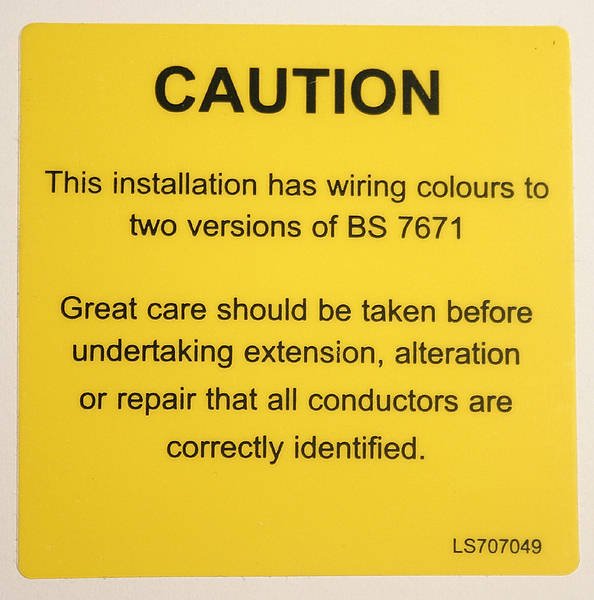You are using an out of date browser. It may not display this or other websites correctly.
You should upgrade or use an alternative browser.
You should upgrade or use an alternative browser.
jointing an older piece of cable with new
- Thread starter casamena
- Start date
Sponsored Links
Nothing prohibiting it, as long as the insulation resistance of the old wiring is still within spec.
P
Paul_C
How could there be such a regulation?
It would make it impossible to ever extend or modify anything without rewiring the entire installation.
It would make it impossible to ever extend or modify anything without rewiring the entire installation.
How could there be such a regulation?
It would make it impossible to ever extend or modify anything without rewiring the entire installation.
One thing you must do

Sponsored Links
- Joined
- 11 Jan 2004
- Messages
- 42,733
- Reaction score
- 2,633
- Country

is there a regulation that prohibits this, ive looked through the regs but can not find any wording that suggests this.
Yes, depending on how and where you intend to make that joint.
How could there be such a regulation?
There are such regulations.
It would make it impossible to ever extend or modify anything without rewiring the entire installation.
No it wouldn't. The regulations govern how and where the joints are made.
How could there be such a regulation?
It would make it impossible to ever extend or modify anything without rewiring the entire installation.
exactly i agree. the reason i ask is because an electrician has made some points of why a friend needs to have a full rewire. one being
"New cable connected with old" with this i presume he means jointing new with old.
yes 526.5 type of connection, and wether it needs to be accessible reg 526.3. but this electrician suggests not to connect old with new."Yes, depending on how and where you intend to make that joint. "
If it's very very old cable then you might be better off not connecting it but it's more to do with what the cable is made of rather than age. But there is no regulation which prevents you joining new and old cable, but you are told how it should be done. I think you (we) need a bit more info before you can decide.
If it's very very old cable then you might be better off not connecting it but it's more to do with what the cable is made of rather than age. But there is no regulation which prevents you joining new and old cable, but you are told how it should be done. I think you (we) need a bit more info before you can decide.
the older cable on ring is flat pvc the old colours of black and red i believe that it is recent visually looks in good condition allthough not been tested by anyone else.
J
Johnmelad502
If it's very very old cable then you might be better off not connecting it but it's more to do with what the cable is made of rather than age. But there is no regulation which prevents you joining new and old cable, but you are told how it should be done. I think you (we) need a bit more info before you can decide.
the older cable on ring is flat pvc the old colours of black and red i believe that it is recent visually looks in good condition allthough not been tested by anyone else.
No reason for not joining old with new, just the method. Buried or accessable joints to consider.
P
Paul_C
The regulations govern how and where the joints are made.
Well yes, they govern the type and location of such connections, just as if you were connecting two brand new cables. I was reading the question as talking about a blanket ban on splicing old to new.
- Joined
- 11 Jan 2004
- Messages
- 42,733
- Reaction score
- 2,633
- Country

I'm not having a mass debate!
P
Paul_C
One thing you must do

Depends upon how old the "old" cables are though. That's what makes the notion of supposedly not allowing "old" and "new" cables to be joined rather curious: How old is old? Older than the cable you're adding now? That could be a cable installed 40 years ago (red/black) or it could be one installed just last year (brown/blue). Older than a specific year? Hard to tell the exact date of installation in a lot of cases, just the approximate age.
And if anyone wanted to be pedantic about those notices, it's quite possible to find an installation which has colors to two different versions of BS7671, plus colors to an earlier edition of the Wiring Regs. (years before BS7671 came into existence). I wonder why they don't specify adding that to the warning notice?
DIYnot Local
Staff member
If you need to find a tradesperson to get your job done, please try our local search below, or if you are doing it yourself you can find suppliers local to you.
Select the supplier or trade you require, enter your location to begin your search.
Please select a service and enter a location to continue...
Are you a trade or supplier? You can create your listing free at DIYnot Local
Sponsored Links
Similar threads
- Replies
- 27
- Views
- 2K

